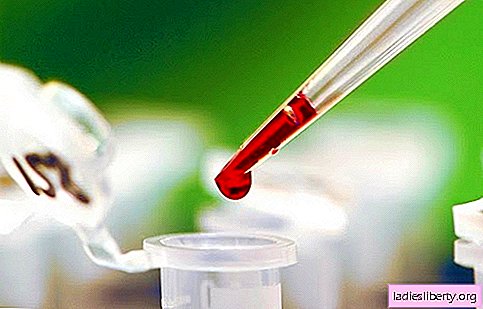
Very often we have to hear the numerous complaints of expectant mothers about the constant donation of blood for examination. Such disturbances are most likely caused by a lack of understanding of why each analysis is necessary. After all, blood is the most valuable informant of the internal state of the body of a pregnant woman, therefore, regular testing allows you to track the dynamics of changes that continuously occur in an "interesting situation", and in case of deviations - immediately respond and together with an obstetrician-gynecologist find the best way out of the situation, without harming the fetus.
Taking blood for examination (clinical analysis or from a vein) is a very simple procedure that does not traumatize the health of the expectant mother and baby, and also does not require expensive equipment. It is necessary to understand one more important nuance: the corresponding blood test is done strictly on time, since the composition of the biological fluid is constantly changing over the course of pregnancy. Therefore, if the attending physician recommends passing one or another type of analysis in the third week, you do not need to pull the "cat by the tail" and delay the time to avoid high errors.
What blood tests to take during pregnancy?
The expectant mother will have to donate the first blood immediately after registration. So, the first package of tests includes: clinical (general) and biochemical blood tests, as well as tests for antibodies to HIV, hepatitis, syphilis, blood type, Rh factor, coagulation and the presence of TORCH infections.
Double test - study of hCG and globulin RAPP-A
If there are no pathologies in the development of pregnancy, and the woman feels satisfactorily (not counting toxicosis) during the first trimester, then she will go through the next series of examinations at 10-14 weeks. At this stage, we study the parameters of hCG and the placental protein PAPP-A (double test), which allow us to determine the general course of pregnancy, the state of the embryo, suspect a threat of miscarriage, placental insufficiency, non-developing and ectopic pregnancy, and establish the likelihood of mental or physical disorders in the fetus.
Triple detailed test
In the period from 16 to 18 (maximum - 20) weeks, a woman will have to undergo a triple detailed test (hCG, estriol, ACE are analyzed), general, biochemical tests, HIV, hepatitis and RW tests, and a coagulogram. A triple detailed test involves the study of markers of genetic pathology (Down syndrome) and abnormalities in the development of internal organs, including the brain (high level of ACE), in a child. Free estriol is the main indicator of the state of immunity and the placenta of the embryo. A similar analysis is performed once using maternal venous blood.
In the third trimester, a woman also needs to re-take all the tests (general, biochemical, for antibodies to HIV, hepatitis, coagulogram).
General (clinical) blood test during pregnancy
Blood is the same "living" tissue of the human body, like any other, only liquid. We all know from school (and more than once we have encountered a general blood test) of what basic components it consists of: liquid tissue - plasma, bodies - red blood cells, white blood cells and platelets. It is these little bodies, each of which performs its function, that become objects for study.
A general blood test allows you to determine:
- The presence of the initial stage of the inflammatory process in the body of a pregnant woman. Early diagnosis will help to quickly destroy the outbreak before it "reaches" the fetus.
- The nature of blood coagulation, which is important in assessing the consequences of blood loss in the process of labor.
- Available hemoglobin level.
It is known that during the period of bearing a child there is a slight decrease in the level of red blood cells in the blood. Due to the load on the body, the life of blood cells containing hemoglobin is somewhat shortened, so the deficiency of "iron" is a fairly common phenomenon observed during pregnancy. A slight decrease in hemoglobin (up to 110) does not pose a serious danger to the baby, but if he drops to a critical point, a terrible condition develops - anemia. Normally, hemoglobin should not fall below 110, otherwise the risk of complications, including oxygen starvation of the fetus, will increase sharply. It is important to remember: timely diagnosis and a competent approach to the treatment of anemia will avoid many problems associated with a pregnant woman and her unborn child.
Biochemical blood test during pregnancy
Biochemical analysis, as a rule, gives a more detailed picture of the condition and allows you to evaluate the work of the most important internal organs of the mother - the liver, kidneys, pancreas, urinary and gall bladder, as well as determine the deficiency of certain trace elements. Using an informative biochemical analysis, carbohydrate, lipid, protein metabolism, blood protein composition, its electrolytes (calcium, magnesium, potassium), sugar and cholesterol levels, and iron-binding ability of serum (for diagnosing anemia) are evaluated.
A slight increase in cholesterol, globulins and a decrease in calcium during pregnancy does not raise serious concerns, but a significant deviation from the norm should seriously alarm and prompt urgent measures to be taken. Otherwise, the child in the womb will suffer and, most likely, will be "asked" for the light ahead of schedule. Along with a biochemical study, tests are carried out for the presence of HIV infection, hepatitis B and C, syphilis (RW), as well as for the determination of the Rhesus factor and blood group.
Rhesus factor and blood type during pregnancy
Even if a woman knows her blood type and Rh factor, she necessarily repeats the analysis when registering for pregnancy. A study to determine these indicators is usually carried out once, but with the slightest doubt in the reliability of the result - it can be repeated.
Difficulties can arise if a Rh-negative woman has a pregnancy from a Rh-positive man. In such a situation, there is a likelihood of Rh sensitization, when there is an incompatibility of the mother and the embryo by blood. That is why, for the safety of the expectant mother with a negative Rhesus affinity, they regularly analyze for the presence of antibodies or their titer (quantity).
Research on TORCH infections during pregnancy
TORCH infection (from Latin TORCH is an abbreviation for the most common and dangerous intrauterine infections for the fetus: Toxoplasma Rubella rubella, Cytomegalovirus and Herpes) is diagnosed by the presence of antibodies to the corresponding pathogen. If an acute infection is detected, the doctor prescribes a study in dynamics with the aim of a more detailed study of the activity of the "enemy" and disease control.
In this article, we have listed the primary blood tests that every pregnant woman should have. Not for myself, not for the doctor, but first of all - for a small person developing inside. After all, health is at stake, and possibly the life of an unborn baby! Do not refuse planned examinations, think about it!
Comments











